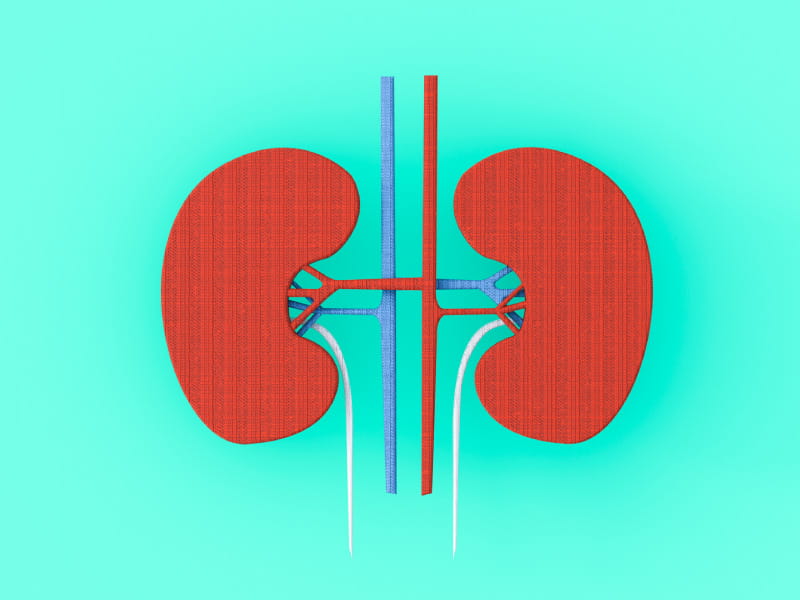Report redefines overlapping risks of heart and kidney diseases
By American Heart Association News

Citing the vast number of people affected and the serious health consequences, heart health experts are redefining the overlapping effects of obesity, Type 2 diabetes, chronic kidney disease and cardiovascular disease and rethinking how they predict long-term cardiovascular risks.
A presidential advisory from the American Heart Association, published Monday in the journal Circulation, defines the overlap as cardiovascular-kidney-metabolic syndrome, or CKM syndrome. The advisory also suggests updates to the risk calculator that helps health care professionals predict a person's likelihood of having a heart attack or stroke.
CKM affects nearly every major organ, including the brain, kidneys and liver, and the cardiovascular system. It affects blood vessels and heart muscle function, the rate of fatty buildup in arteries, electrical impulses in the heart and more.
The advisory spells out stages of CKM, ranging from 0, where there are no risk factors and the focus is on prevention, to 4, which may include kidney failure. Treatments are specified for each stage.
"Screening for kidney and metabolic disease will help us start protective therapies earlier to most effectively prevent heart disease and best manage existing heart disease," Dr. Chiadi E. Ndumele, who led the expert panel that wrote the advisory, said in a news release.
The advisory is particularly focused on identifying people in early stages of CKM syndrome, said Ndumele, an associate professor of medicine and director of obesity and cardiometabolic research in the division of cardiology at Johns Hopkins University in Baltimore.
Type 2 diabetes and obesity are metabolic conditions — the "M" in CKM — and also are risk factors for cardiovascular disease, which is the most common cause of death for people with Type 2 diabetes and chronic kidney disease.
CKM syndrome is a consequence of the historically high prevalence of obesity and Type 2 diabetes in adults and youth, the advisory says. According to AHA statistics, a third of U.S. adults has three or more risk factors that contribute to cardiovascular disease, metabolic disorders and kidney disease.
The advisory informs health care professionals and the general public about the best ways to manage the syndrome, Ndumele said. "We now have several therapies that prevent both worsening kidney disease and heart disease."
The advisory emphasizes that people can take steps to limit or reduce the harm from CKM syndrome and that the best time to do so is in its early stages.
The stages are defined as:
Stage 0 – No CKM risk factors. The goal at this stage is to prevent CKM syndrome through healthy eating, physical activity and sleep habits, avoiding nicotine and maintaining optimal weight, blood pressure, blood sugar and cholesterol levels.
Stage 1 – A person has excess body fat, an unhealthy distribution of body fat, such as abdominal obesity, or impaired glucose tolerance or prediabetes. At this stage, lifestyle changes and a goal of at least 5% weight loss are suggested, along with treatment for glucose intolerance if needed.
Stage 2 – This stage includes people with Type 2 diabetes, high blood pressure, high triglycerides or kidney disease. The goal of care is to treat these conditions to prevent progression to cardiovascular disease and kidney failure.
Stage 3 – People in this stage have early cardiovascular disease without symptoms, as well as metabolic risk factors, kidney disease or a high predicted risk for cardiovascular disease. Intensified efforts to prevent progression to symptomatic cardiovascular disease and kidney failure may involve increasing or changing medications and an additional focus on lifestyle changes.
Stage 4 – In this stage, people have cardiovascular disease with symptoms and excess body fat, metabolic risk factors or kidney disease. People may have already had a heart attack or stroke or may already have heart failure, peripheral artery disease or atrial fibrillation. Stage 4 is divided into subcategories for those with and without kidney failure.
The advisory suggests ways that professionals from different specialties can better work together, Ndumele said, and emphasizes the importance of addressing social factors, such as nutrition insecurity and opportunities for exercise. A separate scientific statement, also published in Circulation, spells out evidence for the approach outlined in the advisory.
The advisory also proposes updating the cardiovascular disease risk calculator to include measures of kidney function, Type 2 diabetes control and social determinants of health.
The current calculator, known as the Pooled Cohort Equation, has been used since 2013 to help predict the risk of a heart attack or stroke in the next 10 years for people ages 40 to 75. The equation includes health and demographic factors about a person and is used to guide lifestyle recommendations and treatment decisions.
The advisory also suggests that the new risk tool be used in people as young as 30, calculate both 10- and 30-year cardiovascular risk, and be expanded to predict for heart failure, a condition where the heart can't pump efficiently.
The advisory also calls for systemic changes to address CKM.
"There is a need for fundamental changes in how we educate health care professionals and the public, how we organize care and how we reimburse care related to CKM syndrome," Ndumele said.




